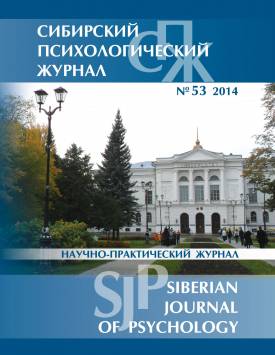The study of life satisfaction and life-purpose orientations at elderly and senile age
The aim of the study is the analysis of mental characteristics of people in terms of life satisfaction and the presence of life-purpose orientations at elderly and senile age. The results of the study are designed to solve topical problems on the optimization of mental aging of a person, due to both specific factors of aging and demographic changes in population towards its aging with regard to the fact that the problem of life-purpose orientations and life satisfaction of elderly people is considered to be an understudied issue in the aspects of age- and gender-related features of this phenomenon, the existence and character of relationship between the components of life satisfaction and life-purpose orientations, as well as the manifestations of disintegration in the value-semantic field. The following factors are analyzed as the test hypotheses: the differences in life satisfaction in elderly and senile age, the differences in the structure of life orientations in elderly and senile people with high and low levels of life satisfaction, the presence of factors that contribute to the formation and maintenance of life satisfaction in elderly and senile people, and the change in the differences in the structure of life satisfaction in men and women with age. The test contingent consisted of 162 respondents from the Zabota social service center for elderly and disabled people in the age range 55 - 90, consisting of people of elderly and senile age; the questioning is carried out in the form of personal interviews followed by filling in the forms. The results of the study lead to the following conclusions. The structure of life orientations remains largely unchanged throughout the late stage of ontogenesis; however, people become more self-confident with age, which allows them control the events of their life, as well as the belief in their ability to control and manage their life. The level of life satisfaction does not experience significant changes with age according to most indicators, which proves that age is not the main factor determining whether or not a person is satisfied with life. However, the analysis of intergroup differences suggests that life satisfaction may depend on the meaningfulness of life and life-purpose orientations of a person, as well as on the value-semantic sphere. Thus, respondents with high levels of life satisfaction differ in the formation of goals and directions for future, commitment to the process of life, satisfaction with their past and self-realization, faith in their own strength and conviction in their freedom of making decisions and controlling life. They are characterized by lower disintegration in the value-semantic sphere and lower conflict rates.
Keywords
emotional discomfort, life-purpose orientation, emotional comfort, life satisfaction, old age, elderly age, эмоциональный дискомфорт, эмоциональный комфорт, смысложизненные ориентации, удовлетворенность жизнью, пожилой возраст, старческий возрастAuthors
| Name | Organization | |
| Suslova Tatiana F. | Russian State Social University (Moscow) | sibir812@mail.ru |
| Zhuchkova Svetlana M. | Russian State Social University (Moscow) | fotine@mail.ru |
References

The study of life satisfaction and life-purpose orientations at elderly and senile age | Sibirskiy Psikhologicheskiy Zhurnal – Siberian Journal of Psychology. 2014. № 53.
